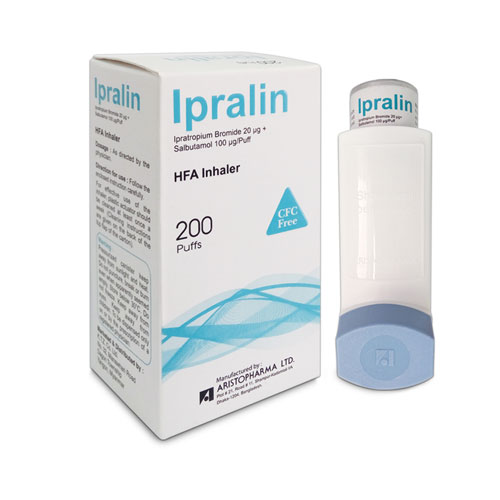
IPRALIN Inhaler
Therapeutic Class
Antiasthmatic & COPD Preparations
Indications
Ipralin® HFA Inhaler is indicated for use in patients with chronic obstructive pulmonary disease (COPD) on a regular aerosol bronchodilator who continue to have evidence of bronchospasm and who require a second bronchodilator.
Chemical Composition
Each puff delivers Ipratropium bromide BP 20 mcg and Salbutamol BP 100 mcg
Packaging
Ipralin HFA Inhaler: Each canister contains 200 puffs.
Dosage & Administration
The dose of Ipralin® HFA Inhaler is 2 puffs 4 times a day. Patients may take additional puffs as required; however, the total number of puffs should not exceed 12 in 24 hours.
Contraindications
Ipralin® HFA Inhaler is contraindicated in patients with a history of hypersensitivity to soya lecithin or related food products such as soybean and peanut. Ipralin® HFA Inhaler is also contraindicated in patients hypersensitive to any component of the drug product or to atropine or its derivatives.
Side Effects
Headache, pain, influenza, bronchitis, dyspnea, coughing, respiratory disorders, pneumonia, upper respiratory tract infection, pharyngitis, sinusitis, rhinitis have been reported. Additional adverse reactions reported include edema, fatigue, hypertension, dizziness, nervousness, paresthesia, tremor, dysphonia, insomnia, diarrhea, dry mouth, dyspepsia, vomiting, arrhythmia, palpitation, tachycardia, arthralgia, angina, increased sputum, taste perversion, and urinary tract infection/dysuria.
Drug Interaction
Drug interaction Ipratropium bromide and salbutamol sulfate inhaler has been used concomitantly with other drugs, including sympathomimetic bronchodilators, methylxanthines, and oral and inhaled steroids, commonly used in the treatment of chronic obstructive pulmonary disease. With the exception of salbutamol, there are no formal studies fully evaluating the interaction effects of ipratropium bromide and salbutamol sulfate inhaler and these drugs with respect to effectiveness. Anticholinergic agents: Although ipratropium bromide isminimally absorbed into the systemic circulation, there is some potential for an additive interaction with concomitantly used anticholinergic medications. Caution is therefore advised in the co-administration of ipratropium bromide and salbutamol sulfate inhaler with other anticholinergic-containing drugs. Beta-adrenergic agents: Caution is advised in the co-administration of ipratropium bromide and salbutamol sulfate inhaler and other sympathomimetic agents due to the increased risk of adverse cardiovascular effects. Beta-receptor blocking agents and salbutamol inhibit the effect of each other. Beta-receptor blocking agents should be used with caution in patients with hyperreactive airways. Diuretics: The ECG changes and/or hypokalemia which may result from the administration of non-potassium sparing diuretics (such as loop or thiazide diuretics) can be acutely worsened by beta-agonists, especially when the recommended dose of the beta-agonist is exceeded. Although the clinical significance of these effects is not known, caution is advised in the co-administration of beta-agonist-containing drugs, such as ipratropium bromide and salbutamol sulfate inhaler, with non-potassium sparing diuretics. Monoamine oxidase inhibitors or tricyclic antidepressants: Ipratropium bromide and salbutamol sulfate inhaler should be administered with extreme caution to patients being treated with monoamine oxidase inhibitors or tricyclic antidepressants or within two weeks of discontinuation of such agents because the action of salbutamol on the cardiovascular system may be potentiated.

